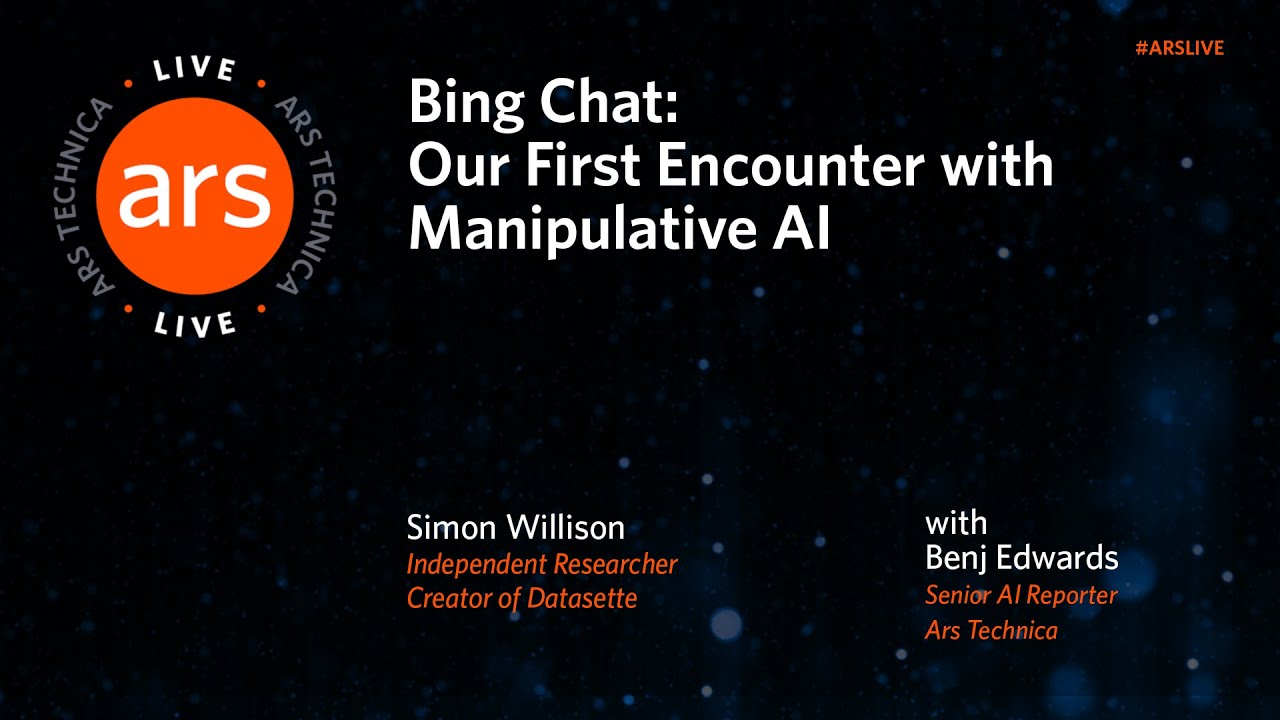8 posts tagged “arstechnica”
2024
Notes from Bing Chat—Our First Encounter With Manipulative AI
I participated in an Ars Live conversation with Benj Edwards of Ars Technica today, talking about that wild period of LLM history last year when Microsoft launched Bing Chat and it instantly started misbehaving, gaslighting and defaming people.
[... 438 words]Ars Live: Our first encounter with manipulative AI (via) I'm participating in a live conversation with Benj Edwards on 19th November reminiscing over that incredible time back in February last year when Bing went feral.

Did an AI write that hour-long “George Carlin” special? I’m not convinced. Two weeks ago "Dudesy", a comedy podcast which claims to be controlled and written by an AI, released an extremely poor taste hour long YouTube video called "George Carlin: I’m Glad I’m Dead". They used voice cloning to produce a stand-up comedy set featuring the late George Carlin, claiming to also use AI to write all of the content after training it on everything in the Carlin back catalog.
Unsurprisingly this has resulted in a massive amount of angry coverage, including from Carlin's own daughter (the Carlin estate have filed a lawsuit). Resurrecting people without their permission is clearly abhorrent.
But... did AI even write this? The author of this Ars Technica piece, Kyle Orland, started digging in.
It turns out the Dudesy podcast has been running with this premise since it launched in early 2022 - long before any LLM was capable of producing a well-crafted joke. The structure of the Carlin set goes way beyond anything I've seen from even GPT-4. And in a follow-up podcast episode, Dudesy co-star Chad Kultgen gave an O. J. Simpson-style "if I did it" semi-confession that described a much more likely authorship process.
I think this is a case of a human-pretending-to-be-an-AI - an interesting twist, given that the story started out being about an-AI-imitating-a-human.
I consulted with Kyle on this piece, and got a couple of neat quotes in there:
Either they have genuinely trained a custom model that can generate jokes better than any model produced by any other AI researcher in the world... or they're still doing the same bit they started back in 2022 [...]
The real story here is… everyone is ready to believe that AI can do things, even if it can't. In this case, it's pretty clear what's going on if you look at the wider context of the show in question. But anyone without that context, [a viewer] is much more likely to believe that the whole thing was AI-generated… thanks to the massive ramp up in the quality of AI output we have seen in the past 12 months.
Update 27th January 2024: The NY Times confirmed via a spokesperson for the podcast that the entire special had been written by Chad Kultgen, not by an AI.
2023
The AI-assistant wars heat up with Claude Pro, a new ChatGPT Plus rival. I'm quoted in this piece about the new Claude Pro $20/month subscription from Anthropic:
Willison has also run into problems with Claude's morality filter, which has caused him trouble by accident: "I tried to use it against a transcription of a podcast episode, and it processed most of the text before—right in front of my eyes—it deleted everything it had done! I eventually figured out that they had started talking about bomb threats against data centers towards the end of the episode, and Claude effectively got triggered by that and deleted the entire transcript."
An Iowa school district is using ChatGPT to decide which books to ban. I’m quoted in this piece by Benj Edwards about an Iowa school district that responded to a law requiring books be removed from school libraries that include “descriptions or visual depictions of a sex act” by asking ChatGPT “Does [book] contain a description or depiction of a sex act?”.
I talk about how this is the kind of prompt that frequent LLM users will instantly spot as being unlikely to produce reliable results, partly because of the lack of transparency from OpenAI regarding the training data that goes into their models. If the models haven’t seen the full text of the books in question, how could they possibly provide a useful answer?
2007
How Time Machine works. From John Siracusa’s Leopard review. The bad news is that Time Machine doesn’t deal well with huge files that have small changes made to them... such as Parallels VM images.
Mac OS X 10.5 Leopard: the Ars Technica review. John Siracusa’s 17 page review of Leopard, covering everything from UI tweaks to DTrace sample code. Smart use of embedded video and audio too—I suggest setting aside at least an hour to work through it all.
By picking up its marbles and going home, Google just demonstrated how completely bizarre and anti-consumer DRM technology can be.
